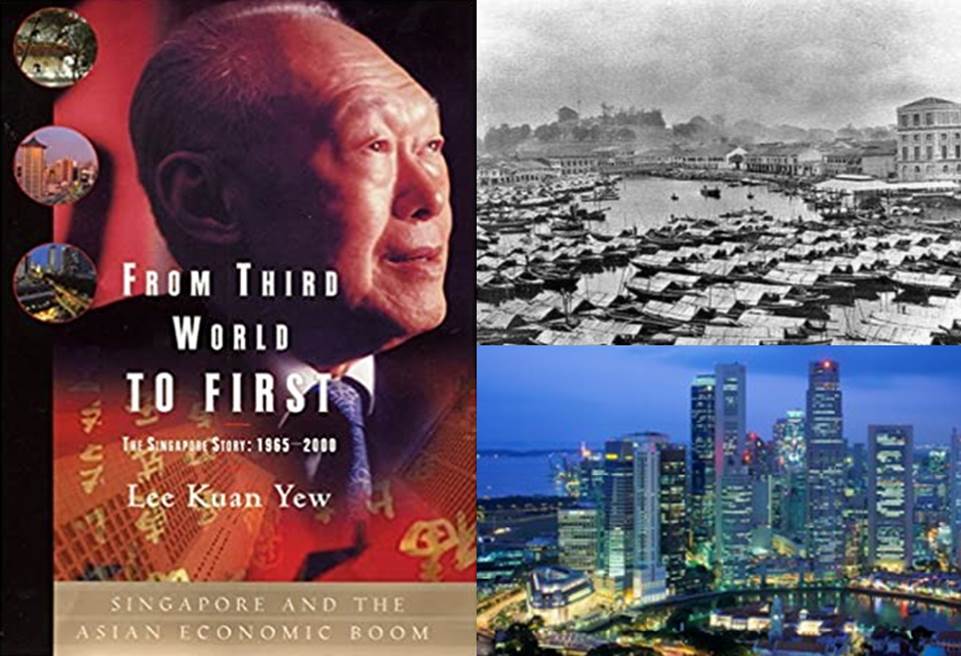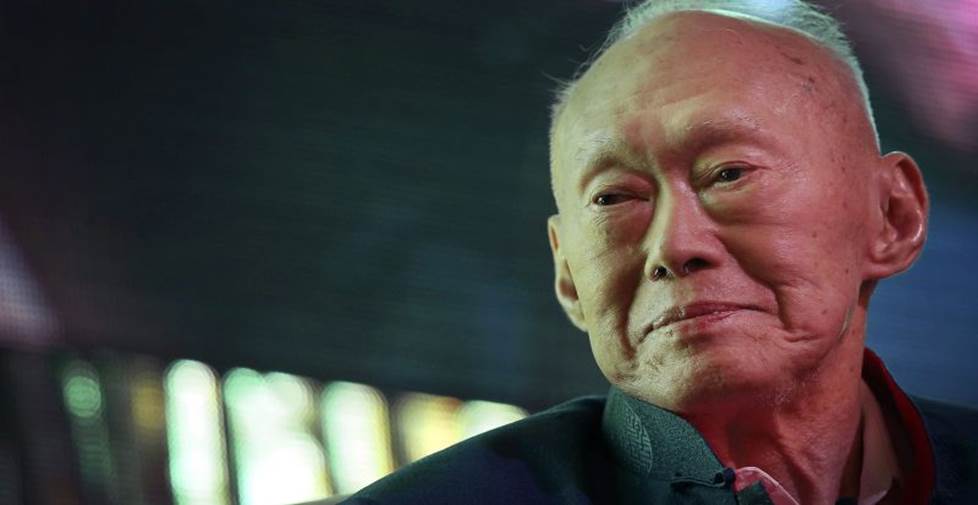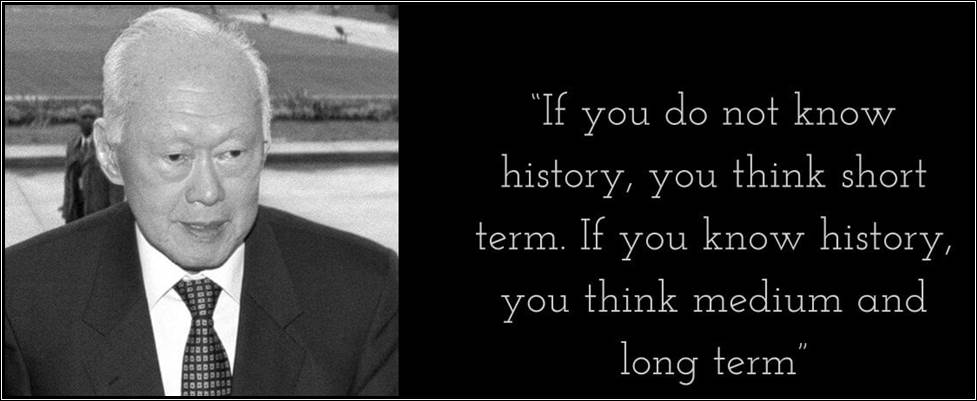Book & Author
Lee Kuan Yew: From Third World to First — The Singapore Story
By Dr Ahmed S. Khan
Chicago, IL

“ The task of the leaders must be to provide or create for them a strong framework within which they can learn, work hard, be productive and be rewarded accordingly. And this is not easy to achieve.” --- Lee Kuan Yew
In contrast to most developing countries — where corrupt, egoistic and power-hungry generals waste no opportunity to seize power and impede their countries progress and development — Lee Kuan Yew’s honest, dynamic and visionary leadership has transformed Singapore from a muddy Island into a 21 st Century economic powerhouse. His economic model continues to be emulated around the globe. His legacy endures.
Lee Kuan Yew (LKY) was born in Singapore on September 16, 1923 and died on March 23, 2015. He read law at Cambridge University, UK. In 1954, he formed the Peoples Action Party (PAP) which won Singapore’s general election five year later. In 1959, LKY, at the age of thirty-five, became the prime minster of Singapore.
After a two-year failed experiment of joining the Malaysian Federation, in 1965, LKY became the prime minter of the independent state of Singapore. Recalling those days LKY writes, “In London Sunday Times (22 August 1965), Richard Hughes wrote, ‘Singapore’s economy would collapse if the British bases --- costing more than 100 million pounds sterling --- were closed.’ I shared these fears but did not express them; my duty was to give the people hope, not demoralize them. In 1990, he resigned as the prime minster and assumed the post of senior minster in the Singapore cabinet; in this capacity, LKY mentored young leaders and created space for Singapore in today’s highly networked global village.
In the second volume of his autobiography,From Third World to First, the Singapore Story: 1965-2000, LKY had compressed 30 years of experience and memories into 700 pages. In the preface, LKY writes, “I wrote this book for a younger generation of Singaporean who took stability, growth, and prosperity for granted. I wanted them to know how difficult it was for a small country of 640 sq km with no natural resources to survive in the midst of larger independent nations all pursuing nationalistic policies.”
The book is divided into three parts: the first part deals with social, economic and political development in Singapore; the second part focuses on foreign relations; and the third part discusses LKY’s family life wherein LKY admires his wife Kwa Geok Choo (who passed away in October 2010) and their three children. LKY was fortunate to have had a very dedicated and smart wife; she provided advice and support in decision making.Like a humble Chinese wife, she never took any credit in public.
Lee and Choo graduated from Raffles College, Singapore, and then studied law at Cambridge University. They got married in 1950. Their younger son, Lee Hsien Yang, ran Singapore Telecommunications (1995-2007), and served as chairman of Singapore civil aviation authority (2009-2018). Their daughter, Lee Wei Ling, a pediatric neurologist, served as the director of National Neuroscience Institute. Their eldest son, Lee Hsien Loong, has held the office of prime minister since 2004.

LKY spent a week in Pakistan from 28 February 1992 and met Prime minister Nawaz Sharif and his key cabinet colleagues. LKY portrays economic and finance minster Sartaj Aziz as “irrepressible optimist.” After his visit to Pakistan, he sent prime minister Nawaz Sharif, a report summarizing actions that should be taken to rectify the economic problems. About Nawaz Sharif, LKY recounts, “…the problem was the often he had neither the time nor the patience to have a comprehensive study made before deciding on a solution.” – Photo CNN
LKY has dedicated one chapter to South Asia, wherein he reflects on the personal traits of leaders, and expounds on the challenges faced by Pakistan and India. Recalling efforts to establish relations with Pakistan, LKY observes, “We established diplomatic relations with Pakistan in 1968 but for many years had little trade or other links. We did not share common positions in international affairs until the 1980s when the Afghan and Cambodian conflicts, both funded by the Soviet Union, brought us together.”
Recounting his 1982 meeting with President Zia-ul-Haq, LKY observes, “He told me that his sole purpose in visiting Singapore was to meet me as the person responsible for modern Singapore. I gave him my standard reply, that modern Singapore was the work of a team...He invited me to Pakistan, which I did in March 1988. He welcomed me in style…once our commercial aircraft crossed the India-Pakistan border near Lahore, six F-16s fighter planes escorted us to Islamabad. He mounted a huge guard of honor for inspection, a 19-gun salute, and hundreds of flag-waving children and dancers to greet me at the airport. I was impressed to see Islamabad noticeably cleaner and better maintained than Delhi, with none of the filth, slums, and streets overflowing with people in the city center. Standards at their guesthouses and hotels were also higher…Zia was heavyset man, with straight black hair carefully combed back, thick moustache, a strong voice, and a confident military manner…At dinner, Zia made an off-the-cuff speech to complement me, not just on Singapore, but especially for standing up to the Western Press…In a press conference before departure , I praised President Zia for his courage in undertaking the dangers of giving logistics support to the Afghans. Had he been a nervous leader who preferred to look the other way, the world would have been worse off. Unfortunately, a few months later, before our relations could progress. Zia was killed in a suspicious plane crash.”
After Zia era ties with Pakistan again got stagnated until Nawaz Sharif became prime minster in November 1990. Discussing the economic issues Pakistan faced, LKY observes, “They had a low tax base, with income tax yielding only 2 percent of their GDP. Many transactions in land sales were not documented and tax evasion was widespread. They subsidized agriculture, railways, and steel mills. Defense took 44 percent of the budget, debt servicing 35 percent, leaving 21 percent to administer the country. Hence their budget deficits were 8 to 10 percent of their GDP and inflation was reaching double-digit figures. The IMF had drawn their attention to these parlous figures. The solutions were obvious but political will was difficult to exercise in a country without an educated electorate and with legislature in the grip of landowners who controlled the votes of their uneducated tenant farmers. This made land and tax reforms near impossible. Corruption was rampant, with massive thievery of state property, including illegal tapping of electricity.”
LKY spent a week in Pakistan from 28 February 1992 and met Prime minister Nawaz Sharif and his key cabinet colleagues. LKY portrays economic and finance minster Sartaj Aziz as “irrepressible optimist.” After his visit to Pakistan, he sent prime minister Nawaz Sharif, a report summarizing actions that should be taken to rectify the economic problems. About Nawaz Sharif, LKY recounts, “…the problem was the often he had neither the time nor the patience to have a comprehensive study made before deciding on a solution.”
Nawaz Sharif visited Singapore in December 1992 and asked LKY to visit Pakistan to assess progress on implementing his recommendations. LKY recounts, “…I discovered many of my recommendation had not been implemented. I had feared this would happen. Before I could visit Islamabad again, confrontation between President Khan and Prime Minister Nawaz Sharif led to the resignation of both and fresh elections. Benazir became Prime Minister.”
Recalling his meeting with Benazir, LKY writes,” Shortly after the election, I met Benazir Bhutto in Davos in January 1994. She was elated and full of ideas. She wanted Singapore to participate in a road project from Pakistan to Central Asia going through Afghanistan. I asked for a detailed proposal for us to study. She also wanted us to look into the viability of sick enterprises in Pakistan and take them over. Her husband was even more ebullient. He was going to build an island off Karachi to develop as free port and a free trade zone with casinos. It was totally uneconomic. Pakistan had so much unused land, what need was there to build an island? Their approach was simple: Singapore was successful, had lots of money, and therefore could invest in Pakistan and make it as successful.”
In March 1995, Bhutto and Asif Zardari visited Singapore. LKY observes, “She said she had heeded my advice in Davos and ensured that all her proposals had been well thought through. She invited Singapore to transfer its labor-intensive industries to Pakistan. I said she would first have to convince our business people…Pakistan’s deep economic and political problems remained…their politics continued to be poisoned by implacable animosities between leaders of the two main parties. Asif Ali Zardari was charged with the murder of his wife’s brother, Murtaza Bhutto. And husband and wife both charged for corruption involving vast sums of money, some of which was traced to Switzerland.”
LKY also recounts meeting Benazir Bhutto and Asif Zardari at a Commonwealth conference in Kuala Lumpur in October 1989: “I spent one long evening on Langkawi island during the “retreat” (informal gathering of the conference members at some resort), chatting with Prime minister Bhutto and her husband Asif Zardari, learning about Pakistani politics and culture. She had youthful good looks, a fair complexion, and a finely chiseled, photogenic face. He was ebullient and outgoing wheeler-dealer, with no inhibitions in telling me that he was ready to consider any deal in anything --- cutting a good deal was what life was about for him. He was in fruit and other export business, in real estate and everything else. I promised to introduce him to some fruit importers to buy his mangoes, which I did when he visited Singapore accompanying his wife to some meeting in 1995.”
LKY observes that Pakistan’s problems were compounded in May 1998 with India’s nuclear explosions. In response Pakistan conducted its own, leaving both countries economically stretched. Reflecting on the people of Pakistan, LKY observes, “The Pakistanis are a hardy people with enough of the talented and well-educated to build a modern nation. But unending strife with India has drained Pakistan’s resources and stunted its potential.”
LKY’s reflections on the Indian leaders start with his dealings with Nehru. As a young student LKY admired Nehru. LKY recounts, “I admired Nehru and his objective of a secular multiracial society. Like most nationalists from British colonies, I had read his books written during his long years in British jails, especially his letters to this daughter. They were elegantly written, and his views and sentiments struck a resonant chord in me.” LKY visited Delhi for the first time as prime minter in April 1962. LKY recalls his meeting with Nehru: “Nehru was pleasantly surprised to find a Chinese so determined not to have Singapore under communist control and the influence of Beijing.” LKY met Nehru again in 1964, he recalls, “I stopped in Delhi on my way back from a tour of Africa. He was a shadow of his former self, weary, weak in voice and posture, slumped on a sofa. His concentration was poor. The Chinese attack across the Himalayas had been a blow to his hopes of Afro-Asian solidarity. I left the meeting filled with sadness. He died a few months later, in May.”
Describing the personality of Indira Gandhi, LKY recounts, “Indira Gandhi was the toughest woman prime minster I have met. She was feminine but there was nothing soft about her. She was a more determined and ruthless leader than Margret Thatcher, Mrs Bandaranaike, or Benazir Bhutto. She had a handsome face with an aquiline nose and a smart hairstyle with a broad streak of white against a jet-black mass of hair combed back from her forehead. And she was always elegantly dressed in a sari. She affected some feminine ways, smiling coquettishly at men during social conversations; but once into the flow of an argument, there was that steel in her that would match any Kremlin leader. “
Comparing Indira Gandhi with her father, LKY observes, “She was unlike her father. Nehru was a man of ideas, concepts he had polished and repolished – secularism, multiculturalism, rapid industrialization of the state by heavy industries in the fashion of the Soviet Union. Right or wrong he was (a) thinker. She was practical and pragmatic, concerned primarily with the mechanics of power, its acquisition, and its exercise. A sad chapter in her many years in office was when she moved away from secularism, and to win the Hindi-Hindu vote in North India, consciously or otherwise brought Hindu chauvinism to surface and allowed it to become a legitimate force in Indian politics. It was to lead to the recurrence of Hindu-Muslim riots, the burning and destruction of the ancient mosque at Ayodhya, and the emergence of Bharatiya Janata Party (BJP), a Hindu chauvinist party, as the single major party in Parliament in 1996 and again in 1998. She was at her toughest when the unity of India was threatened…she ordered troops into the Sikh holy temple in Amritsar…I thought it was a political disaster: She was desecrating the innermost sanctuary of the Sikh religion…She paid for it with her life in 1984, assassinated by her own Sikh bodyguards.”
Remembering the personality of Morarji Desai, LKY recounts, “He was…a strict vegetarian who ate only raw nuts, fruits, and vegetables, nothing cooked…even his milk had to come straight from a cow, not from a bottle…He had a dry sense of humor and a capacious memory, but some unusual ideas…In December 1978…he said that thousands of years ago Indians had made a space journey and visited the planets, which the Americans were then doing. I must have looked skeptical, so he emphasized, ‘Yes, it is true. It is by reincarnation. It is recorded in the Bhagavad Gita.’ ”
Describing Rajiv Gandhi, LKY recalls, “Rajiv was a political innocent who had found himself in the middle of a minefield…I saw him as an airline pilot with a straightforward worldview. In our discussions, he often turned to Natwar Singh. I wondered who guided him through Indian politics…Only a well-meaning prime minster would have sent Indian troops to Sri Lanka to put down a rebellion by Jaffna Tamils. These were descendants of Tamils who had left India over 1,000 years ago and were different from India’s Tamils. Indian soldiers spilled blood in Sri Lanka. They withdrew and the fighting went on. In 1991, a young Jaffna Tamil woman approached him at an election rally near Madras, ostensibly to garland him, and blew them both up. It was not fair. His intentions had been good.”
Describing the environmental degradation in Delhi, LKY observes, “The Delhi I visited in the 1960s was big, sprawling with many open spaces, not polluted and without too many squatters. The Delhi of the 1990s was an environmental mess. It was January and the air smelled foul with the fumes from coal burning in power stations and in homes. There were squatters everywhere. For security, they placed a whole company of soldiers in front of the Sheraton Hotel where I stayed. And traffic was clogged up. It was not the spacious capital it once was.”
Commenting on the problems of economic reforms in India, LKY cites prime minister Inder Kumar Gujral’s statement of 1997 where he had said, “I sometimes feel ashamed, and I hang my head in shame when I am told that India is one of the ten most corrupt countries in the world.” Summarizing India’s problems, LKY observes, “Perhaps the fault lies in the system. India has wasted decades in state planning and controls that have bogged it down in bureaucracy and corruption. A decentralized system would have allowed more centers like Bangalore and Bombay to grow and prosper. Another reason could be their caste system. It has been the enemy of meritocracy --- each caste demands its quota in all institutions, whether recruitment into IAS or entrance to the universities. A third reason is the endless conflicts and wars with Pakistan that make both poorer.”
The transformation of Singapore from third to first world in less than four decades is, indeed, a great testament of Lee Kuan Yew’s dynamic leadership. The leaders of Pakistan and India ought to pay attention to LKY’s advice if they want to free their people from the shackles of poverty, and to promote prosperity and peace in South Asia. From Third World to First, the Singapore Story: 1965-2000is a must read for all students of political science as well as general readers. LKY is very candid in his analysis and very comprehensive in expressing his views on national and international issues. In fact, the book is like a mini course that blends the areas of history, civics, government, politics, international relations, conflict resolution and leadership.
(Dr Ahmed S. Khan – dr.a. s.khan@ieee.org – is a Fulbright Specialist Scholar)


